Asylbewerber haben in Australien kaum eine Chance: Weit vor der eigenen Küste bringt die Marine Flüchtlingsboote auf, lehnt Anträge ab und schickt die Menschen zurück. Doch der Widerstand gegen diese Politik wächst.
Der Weg ist weit, und er führt über den schier endlosen Indischen Ozean: Rund zwei Wochen dauert die Überfahrt, während der tagelang kein Land zu sehen ist. Gerade jetzt, in den Monaten nach dem Sommermonsun, entstehen immer wieder Zyklone mit meterhohen Wellen. Und trotzdem wagen Bootsflüchtlinge aus Sri Lanka immer wieder das Risiko – sie quetschen sich auf überfüllte, rostzerfressene Kutter, die vielleicht für den Fischfang in Küstennähe ausgelegt sind, aber sicher nicht für eine derartig lange Reise über das offene Meer.
Es gebe viele Gründe für Menschen in Sri Lanka, ihr Land zu verlassen, erklärt Alan Keenan, Südasienexperte der International Crisis Group in London: "Für viele Tamilen ist es die Verzweiflung aufgrund fehlender politischer Freiheiten. Denn ihr Land und ihre Gemeinden stehen zu 100 Prozent unter Kontrolle der singhalesischen Armee, und die kümmert sich kaum um die Einhaltung grundlegender Menschenrechte." Auch fünf Jahre nach Ende des Bürgerkrieges herrschen noch immer große Spannungen zwischen beiden Volksgruppen. Viele Singhalesen dagegen treibe eher die desolate wirtschaftliche Lage aus dem Land, so Keenan.
Das Ziel ist für beide Gruppen gleich. Es heißt Australien, und es liegt rund 6.000 Kilometer entfernt. Für die Flüchtlinge ist es das gelobte Land. Denn es verspricht Sicherheit, Wohlstand, ein besseres Leben. Und genug Platz: In Australien teilen sich gerade einmal drei Einwohner einen Quadratkilometer. Und trotzdem schottet "Down under" sich ab. "Stop the boats" hieß ein Wahlkampfslogan des konservativen Politikers Tony Abbott. Mit Parolen wie diesen gewann seine "Liberal Party of Australia" im vergangenen Jahr die Parlamentswahlen. Seitdem setzt Abbott die Slogans konsequent in die Tat um: Seit neun Monaten ist er Premier – seit sieben Monaten hat kein Flüchtlingsboot mehr die australische Küste erreicht.
"Die Asylbewerber sind zu einem hochpolitischen Thema geworden", sagt Gillian Triggs, die Leiterin der staatlich finanzierten australischen Menschenrechtskommission, gegenüber der DW: "Mindestens 1.200 Bootsflüchtlinge sind auf ihrem Weg nach Australien ums Leben gekommen. Die Öffentlichkeit ist schockiert. Die neue Regierung will zeigen, dass sie die Boote frühzeitig stoppen und das Sterben auf hoher See beenden kann."
Aufgebracht auf hoher See
Denn die Boote werden schon abgefangen, lange bevor sie Australien erreichen. In den vergangenen Tagen hat die Küstenwache einen Kutter auf hoher See gestoppt, hunderte Kilometer von der australischen Küste entfernt. An Bord waren 41 Menschen aus Sri Lanka. Nachdem die australischen Behörden die Flüchtlinge per Video-Schalte angehört hatten, lehnten sie alle Asylanträge ab und übergaben das Boot der Marine Sri Lankas. "Offshore processing" nennt die australische Regierung diese Methode – mit der sie sich den Zorn internationaler Menschenrechtsorganisationen zuzieht. Von "schamlosen Verstößen gegen die internationale Flüchtlingskonvention" spricht der "Refugee Council", ein Dachverband australischer Flüchtlingshilfswerke. Auch Gillian Triggs glaubt nicht, dass das Vorgehen der australischen Behörden "den UNHCR-Standards oder den Standards irgendeines anderen Landes entsprechen, das sich je mit Asylbewerbern auseinandergesetzt hat".
Die massiven Proteste zeigten Wirkung. Auf einem zweiten Schiff aus Sri Lanka, das die australische Küstenwache ebenso vor einigen Tagen gestoppt hatte, waren sogar 153 Menschen an Bord. Die meisten von ihnen stammen aus tamilischen Flüchtlingscamps in Südindien. Auch dieses Boot wollte die australische Küstenwache umgehend an die Behörden von Sri Lanka übergeben. Doch das Oberste Gericht setzte zumindest diese Rückführung vorerst aus. Es will die Vorwürfe der Hilfsorganisationen überprüfen.
Flüchtlinge wurden vor Gericht gestellt
Besonders schwer wiegt der Vorwurf, dass Australiens Regierung die Asylgesuche nur lasch und unzureichend überprüften. Graeme McGregor, australischer Flüchtlingsexperte von amnesty international, kritisierte vor allem die Befragung der 41 Bootsflüchtlinge per Videoschalte: "Dies nimmt den Asylsuchenden jede Chance auf eine faire und gerechte Anhörung. Jedem einzelnen wurden ganze vier Fragen gestellt, bevor sie an Sri Lankas Behörden übergeben wurden." Australiens Regierung verschließe wissentlich die Augen vor den andauernden Menschenrechtsverletzungen in Sri Lanka, so McGregor.
Grundsätzlich werden alle abgeschobenen Flüchtlinge, die nach Sri Lanka zurückkehren, vor Gericht gestellt, berichtet Alan Keenan von der International Crisis Group. "Einige werden freigelassen, andere dagegen verurteilt und ins Gefängnis gesteckt. Einige wurden sogar geschlagen und gefoltert – unglücklicherweise eine ganz übliche Praxis in Sri Lankas Gefängnissen." In Sri Lanka ist das "illegale Verlassen des Landes" ein Straftatbestand, der mit bis zu zwei Jahren Gefängnis geahndet werden kann. "Es gibt mehrere dokumentierte Fälle von abgelehnten Asylbewerbern, die nach ihrer Abschiebung nach Sri Lanka gefoltert wurden", so Keenan. Wenn die Menschen als gescheiterte Asylbewerber aktenkundig geworden seien, drohe ihnen sogar mehr Gefahr als zuvor.
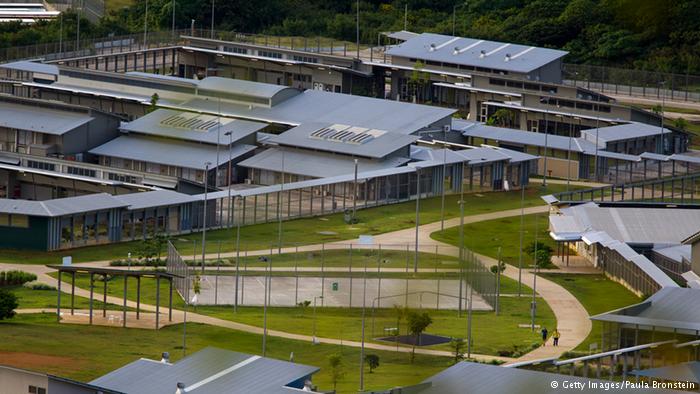
Ein Flüchtlingslager auf der zu Australien gehörenden Weihnachtsinsel - rund 1200 Kilometer vor dem australischen Festland
Stetige Verschärfung der Asylpolitik
Australiens Flüchtlingspolitik steht schon länger in der internationalen Kritik. Hilfsorganisationen stoßen sich unter anderem daran, dass die Regierung in Canberra ein Netz von Flüchtlingslagern in Partnerstaaten und Inselrepubliken weit außerhalb der eigenen Grenzen unterhält, etwa auf Papua Neuguinea oder Nauru. Unter Abbotts Vorgängerregierung waren hier Asylanträge für die Weiterreise nach Australien geprüft worden. Abbotts Liberal Party unterbindet auch dies. Australiens Regierung plant, selbst anerkannte Flüchtlinge nicht ins Land zu lassen, sondern dauerhaft in den Nachbarstaaten unterzubringen. Schließlich seien Flüchtlinge auch auf Papua oder Nauru "keiner Art von Verfolgung ausgesetzt", erklärte Abbott in einem Interview mit dem "Sydney Morning Herald". "Das große Problem mit Staaten wie Papua Neuguinea oder Nauru ist, dass sie selbst keine gnenügenden Rechtsstandards besitzen", moniert Gillian Triggs. "Es ist quasi unmöglich, Asylbewerber dort anzuhören, denn es gibt kein ordentliches Rechtssystem, nach dem sie ihre Asylanträge vorbringen können." Trotzdem hat die Regierung im April 2014 auch mit dem tausende Kilometer entfernten Kambodscha ein entsprechendes Abkommen zur Errichtung von Auffanglagern geschlossen.
Die Abbott-Regierung hatte das Asylrecht zuletzt immer weiter verschärft. Wer einmal bei einem illegalen Einreiseversuch gefasst wird, hat keine Chance mehr auf ein dauerhaftes Aufenthaltsrecht. Stattdessen wird ein höchstens für drei Jahre geltendes "temporäres Schutzvisum" ausgestellt. Zudem besitzen illegal Eingereiste keinen Anspruch auf eine staatliche Rechtsberatung oder Krankenversicherung. Außerdem gelten für sie besonders rigide Vorschriften: Wer auch nur in der Öffentlichkeit flucht oder spuckt, riskiert eine sofortige Abschiebung.
Die Regierung geht sogar noch weiter: Erst im Juni 2014 hatte sie Asylsuchenden so genannte "Rückkehrgelder" in Höhe von 3.000 bis 10.000 US-Dollar geboten, falls diese ihren Asylantrag zurückzögen und freiwillig in ihre Heimatländer zurückkehrten. Von Juli 2012 bis Juni 2013 haben rund 25.000 Flüchtlinge in Australien Asyl beantragt. Die meisten von ihnen kommen nach Angaben des australischen "Refugee Councils" aus dem Iran, aus Afghanistan und aus Sri Lanka.

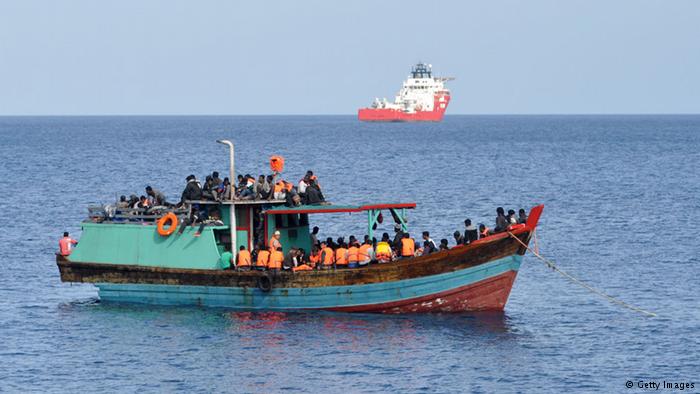
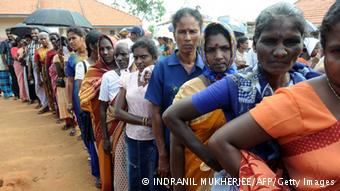
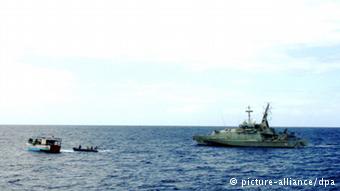
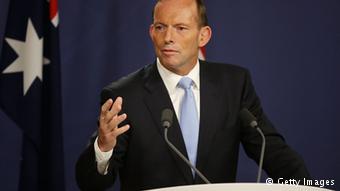
Open Letter to Psychotic Scott Morrison
Independent Australia
Open Letter to Psychotic Scott Morrison
Barry Everingham 28 July 2014, 5:00pm 21
http://tinyurl.com/nvdk4a5
Senior correspondent Barry Everingham has penned an open letter to Australia's unhinged Immigration Minister Scott 'the Christian' Morrison.
Minister Morrison,
I have been active in reporting and commenting on politics in Australia and overseas for almost 60 years and I have seen and heard politicians of all political persuasions state their cases - some articulating them well, others in a style best suited to themselves or their constituencies.
I must admit, I have been taking notice of you with more than just a passing interest and never have I seen a man so ill-suited to handle a task as sensitive as immigration as you.
Do you realise that, as well as being a minister and member of Parliament, you are nothing more or nothing less than a public servant on the public payroll, which is funded by Australian taxpayers.
As such, your performance, I think last Thursday, at your media conference was an absolute disgrace.
Your rudeness hit a new low, even for you, and that's saying something; your arrogance and your patronising manner was sickening.
A few weeks ago, when answering an Opposition question regarding the Asylum seekers (not illegal immigrants) imprisoned on a Customs vessel at sea, you sneered at the questioner and you attempted to smear him by implying he was blaming the vessels crew for keeping men women and children locked up in windowless cabins and allowed fresh air for only 3 hours a day.
You know full well the crew was under instructions from you to follow those inhumane orders and for them to refuse would amount to a mutiny.
I understand that, like Tony Abbott and Kevin Andrews, you claim to be a practising Christian. If what you three men do to helpless, hapless and desperate men women and children, well, it's a different form of Christianity that most people accept.
https://www.youtube.com/watch?v=xcSy_Fl5SKc
You know Minister, if the Parliament was not under the control of a biased outrageous Speaker whose orders come from the likes of Christopher Pyne, most of your answers would be ruled out of order. You give the impression you are suffering from a psychotic condition, which under normal circumstances would require medical attention of a psychiatric nature.
Members of the public want to know who murdered that young Iranian man held by you in custody. Where is that inquiry going?
How many men women and children are self-harming while under your care?
What financial arrangements have you come to with the Government of India to provide a consular contingent to interview those now on land after their ordeal at your hands at sea?
And even you would know the Indian public service is known as one of the world's most inefficient and corrupt groups of men and women found anywhere. How long will those interviews take?
Your mishandling of your portfolio is disgraceful and so are you.
I look forward to your reply.
In the meantime rest assured this will be distributed widely.
Yours sincerely,
Barry Everingham
Creative Commons Licence
This work is licensed under a Creative Commons Attribution-NonCommercial-NoDerivs 3.0
Australia License
https://www.youtube.com/watch?v=Jh_0oXlfk0Q
John Graham originals, including the one above, may be purchased from IA's online store.
http://tinyurl.com/nbx9vdj
See more of John's political art on his Cartoons and Caricatures Facebook page.
http://tinyurl.com/npfp5ev
The Guardian
On asylum seekers, international law can't hold back this government
We're not in a linear 'race to the bottom', of worse and worse breaches of international law, but a
major historical era defined by border panic and cruelty
Anthea Vogl
theguardian.com, Tuesday 29 July 2014 16.18 AEST
In Australia's immigration detention debate, each cruel new invention in the politics of deterrence
is inevitably described as a new low, a lurch or shift to the right, or as government policy having hit
rock bottom. We've crossed both lines and rubicons, jumped chasms, and gone morally bankrupt.
This idea, of a linear process of worse and worse breaches of international law, and more
egregious failures of compliance, is a feature of how we talk about immigration and asylum
seekers. But the idea of a "race to the bottom", when it comes to compliance with our
international obligations, downplays the systemic violence that this government, and governments
before it have inflicted on asylum seekers up until now.
Existing refugee policies are not collectively more or less rightwing or more illegal than former
ones. Each and every reform reflects a new manifestation of the same bipartisan logic: the
systematic persecution of a minority of racialised others, in order to maintain power, or in the case
of private contractors and their investors, to generate profit.
The imbroglio over 157 asylum seekers, allegedly Sri Lankan Tamils, is without precedent in
Australia. It represents this government's contempt for both domestic and international laws that
get in the way of the dubious claim that "not one boat" has arrived since the election. But is it
enough to declare that this episode is a new low? Isn't this policy really a small extrapolation of
the 3,529 "enhanced screening interviews", primarily targeting Sri Lankans, already held between
October 2012 and November 2013?
As of yesterday, an urgent high court hearing to decide the fate of the 157 asylum seekers will no
longer go ahead, and instead a claim for compensation will be made. The case is still before the
courts, with Hugh de Kretser, of the Human Rights Law Centre, saying:
"The case remains over two things: was it legal or not to take these asylum seekers away from
Australia and detain them at sea for a month, and if it wasn't, should the asylum seekers be
entitled to compensation?"
But the reality is that immigration minister Scott Morrison can countenance breaching the most
fundamental protection under the refugee convention - refoulement, or the return of refugees to
their home state - and still claim the government has upheld its international obligations.
This contest over compliance takes place because international law purports to offer a final,
external source of moral and political rightness. Once we've established the illegality of an action,
such as the treatment of those asylum seekers held in windowless rooms on the high seas, there
is some hope the government will have to fall into line, and perhaps the "public" will also see
sense.
But as Morrison's claim shows, international law does not act as a moral arbiter for the
government and does not, on its own, significantly constrain executive power.
We should undoubtedly condemn the federal government's actions as direct and bald-faced
breaches of international law and the Refugee Convention in particular, as lawyers, academics
and advocates have done in recent weeks. International legal standards provide a critical
language and framework to communicate our opposition to government policy.
International legal standards do not enforce themselves. Without economic or political sanctions
in place, or the political power to enforce them, international law's compliance mechanisms are
notoriously limited. Such mechanisms include damage to Australia's international reputation (too
late for that, one assumes) and if a complaint is made, the non-binding rulings of UN human
rights committees.
As well, international standards often provide a fairly limited account of government behaviour.
Legal academic Ben Saul provided a more accurate description of the treatment of the Sri
Lankans, noting it involves extremely grave abuses of government power; was not authorised
under the Migration Act; and is being conducted without public scrutiny and "under the sweeping,
unwritten executive power of the government".
At least one part of the problem is that the government wilfully breaches international and
domestic law, and has enough money in its coffers to throw at its best-paid legal minds to defend
any challenges that might get in their way.
Waleed Aly was right to remind us that while there may be important wins, challenges and losses
in the courts, refugee policy writ large has neither been reset nor altered. While the current high
court challenge may be classed as this government's "Tampa moment", the biggest similarity may
be that like the Howard government, the Abbott government will not suffer any significant losses
for their disregard of the law, international or otherwise.
Win or lose in the courts, these actions of this government should offend regardless of whether
they are done to "genuine" refugees covered by the Refugee Convention or whether or not they
breach the text of international law.
Yes, successive Australian governments have breached international law. But they have also
made bi-partisan executive decisions to re-establish offshore processing, which contributed to the
murder of Reza Barati on Manus Island. In over 20 years of mandatory detention, more than 27
people have died in privatised Australian detention centres. The same policy has led to countless
incidents of self-harm and induced long-term mental and physical illnesses.
Narratives of refugee policy present Australia's treatment of onshore asylum seekers as
unendingly going from bad to worse, punctuated by landmarks and watersheds. But we need to
see the reality: the current policy is more of the same. We are living witnesses to a major era in
Australian history, defined by the brutal maltreatment of asylum seekers, and border panic. And
under the current government, it is almost certain that we're yet to reach rock bottom, wherever
that might be.
http://tinyurl.com/pz92fv6